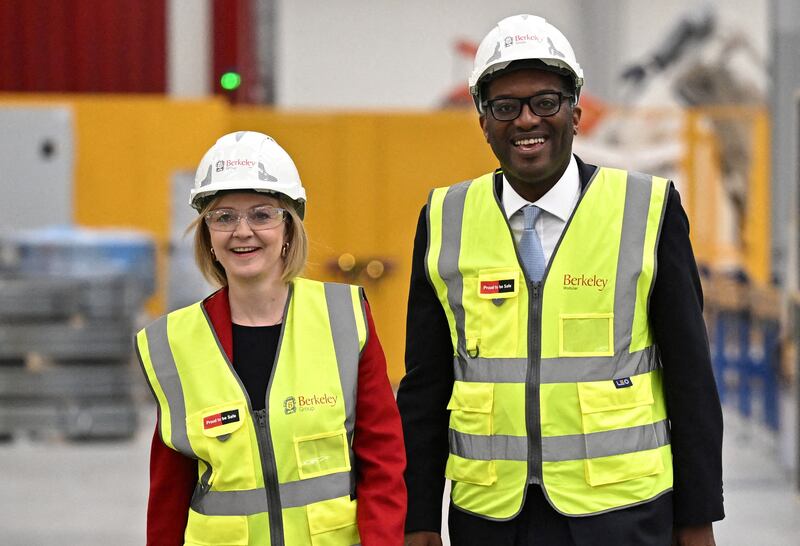Division and despondency have returned to the Conservative Party amid talk of a financial crisis caused by Chancellor Kwasi Kwarteng's mini-budget, a little over three weeks after the new leadership team took charge of the country.
Politics was put on hold during the mourning period following the death of Queen Elizabeth, meaning it was the first major policy announcement to follow through on promises made during the leadership campaign.
But Tory MPs are openly questioning the path taken by Mr Kwarteng and Prime Minister Liz Truss after turmoil erupted in the markets in the wake of a plan to cut taxes for the richest and increase borrowing in the hunt for economic growth.
After a summer of tearing each other apart in the search for a leader to replace scandal-plagued Boris Johnson, the mood in the party once again plummeted as some MPs hit out at the plans announced on Friday by Mr Kwarteng, with one prominent backbencher calling his party leader’s plan “inept madness”.
It comes as the Bank of England was forced to launch an emergency bond-buying programme to prevent borrowing costs from spiralling out of control and to stave off a “material risk to UK financial stability”.
The International Monetary Fund, in a highly unusual move, has already flagged serious concerns about the mini-budget.
The crisis has prompted Labour and other opposition parties to call for a recall of Parliament, so MPs can hear from the chancellor about his plans to restore market confidence.

There were signs on Wednesday of outright worry within the party, with MPs — some of whom backed Rishi Sunak in the leadership contest — making public their own unhappiness with the political and economic chaos of recent days.
A long-serving Conservative MP told The National that there were now calls for Mr Kwarteng to be sacked as chancellor following his destabilising budget.
“It’s fair to say there’s just sheer disbelief in the party over what has happened in the last few days. We may well see one of the shortest chancellor careers in history with Kwasi getting the sack. What might happen after that is totally unclear. Bring back Rishi?”
Political sources have indicated that the former chancellor, who came second in the race to succeed Mr Johnson, will not attend the Conservative Party conference beginning on Sunday, instead staying at his constituency in Yorkshire.
But his political position has been significantly strengthened by his strong arguments during the leadership campaign against tax cuts before first stabilising spending and inflation.
There is also speculation that parliament will be recalled to deal with the growing emergency but this is likely to be resisted by the Conservatives just as they begin their important conference that could see further division and drama.
With pension funds vulnerable to the growing economic disaster, older Tories will be asking hard questions at the Birmingham conference.
Mel Stride, Conservative chairman of the Commons Treasury Committee, warned “there’s a lot of concern within the parliamentary party, there’s no doubt about that”.
He told Sky News: “I don’t want to speculate on the future of the chancellor other than to say that I think where the party should be at the moment is really uniting at a time of economic crisis.
“The last thing we want now is a political crisis to compound that, and I think really focus on this issue of growth.”
Simon Hoare, the chairman of the Northern Ireland Select Committee, cited the former Conservative chancellor Norman Lamont during the sterling crisis of 1992 as he tweeted: “These are not circumstances beyond the control of govt/Treasury. They were authored there. This inept madness cannot go on.”
Tory MP Robert Largan also came out to label as a “mistake” the decision to cut the top income tax rate when “the Government’s fiscal room for manoeuvre is so limited”.
The High Peak MP tweeted: “This is a deeply worrying time. Elected officials need to be honest about the choices we face and government needs to take a pragmatic, fiscally responsible approach on the short-term support needed for people and long-term strategic thinking to ensure our energy security.”
Unease has been brewing in wider Conservative circles too.
Nick Timothy, who was chief of staff to former PM Theresa May, attacked the government’s plan.
“This is not conservatism,” he tweeted.
“And it is not what conservatives do. Ideology and unnecessary risks with market confidence are supposed to be what the other side does. We do need a different plan — but this is a disaster that should never have happened.”
Nonetheless, some defenders of the prime minister have been vocal, with one Conservative peer suggesting that the crisis in the markets was driven by concerns over the possibility of a Labour government.
Daniel Hannan, one of the key Conservative voices behind the push to leave the EU, wrote an article for the ConservativeHome website playing down market concerns about the £45 billion package of tax cuts announced by Mr Kwarteng.
In the piece, which was published on Wednesday and immediately mocked online, Lord Hannan wrote: “What we have seen since Friday is partly a market adjustment to the increased probability that Sir Keir Starmer will win in 2024 or 2025 — leading to higher taxes, higher spending, and a weaker economy.”
He suggested the reaction to the mini-budget was driven by “motivated reasoning”.
“Some pundits don’t like Truss, others have never forgiven the Tories for Brexit, yet others are horrified by the idea that growth, rather than equality, should be the government’s priority.
“Fair enough. But let’s be clear-headed about what is happening.”
Lord Hannan downplayed the significance of the tax cuts in historical terms.
“To blame these tiny tax reductions for the fall in the pound is akin to a fly alighting on an exhausted shire horse as it lies down to sleep, and telling itself that it wrestled the mighty beast to the ground.”
The article was praised by Lord Frost, the former Brexit negotiator, who called it an “excellent piece”.
However, many mocked the article online and rubbished the peer’s analysis.
Sir Keir also called the comments “complete nonsense”.
The Labour leader told C4 News: “That’s just a ridiculous assertion. I don’t even think the Tory party are taking that seriously.
“It’s very obvious that this is a direct result of the budget on Friday.”
Elsewhere, Julian Smith, a Tory MP and former cabinet minister, reacted strongly to comments by Lord Frost dismissing the concerns of the IMF.
“Arghhhhhhhhhhhhhhhhh,” he tweeted.
But Ms Truss's supporters dismissed the concerns about the Treasury's plans.
Sir John Redwood, a Tory MP, said: "[The IMF] didn't warn us or the other central banks in the run-up to the big inflation, that the monetary policies of 2021 were far too loose, interest rates far too low, and the money printing was getting out of control.”
He said the government should be prudent, but “the truth is if the austerity policies have their way and we have a big recession, the borrowing won't go down, the borrowings will soar”.
“My message today is that the government are right to see the main threat for the year ahead is recession not inflation, because the good news is that all forecasters say inflation will come down a lot next year, and the sooner the better.”






